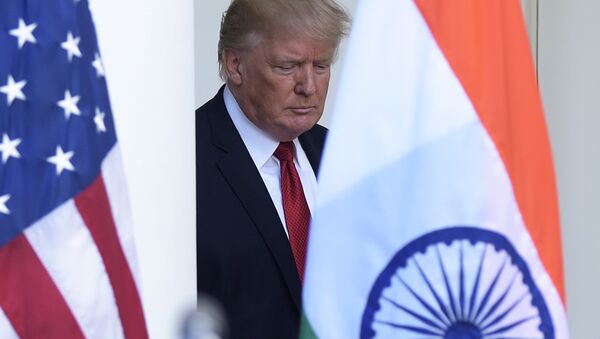New Delhi (Sputnik) — The White House has confirmed having received the Indian government's invitation to President Donald Trump as a special guest for the Jan. 26, 2019 Republic Day celebrations in New Delhi but has indicated that the decision on participation will only be taken after the 2+2 ministerial dialogue scheduled for September 6.
READ MORE: India's Defense Minister on S-400 Deal: US Laws Don't Apply to New Delhi
"I know that the invitation has been extended, but I don't believe a final decision has been made. I do know that both Secretary Mattis and Secretary Pompeo will be traveling to India — I believe it's next month — and will begin the dialogue and the process and potential discussion for a presidential visit later in the year," White House press secretary Sarah Sanders said on Wednesday.
— Rishikesh Kumar (@rishhikesh) August 2, 2018
The 2+2 ministerial dialogue will is expected to witness extensive discussions on strategic and defense matters by the foreign and defense ministers of India and the US.
The 2+2 dialogue which was postponed twice earlier is expected to facilitate some progress on the crucial Communications Compatibility and Security Agreement (COMCASA). Several other bilateral trade issues particularly regarding the prices of medical equipment, the H1B US visa row, the import tariff on steel and aluminum, etc will come up for discussion during the meet. The meeting will also decide whether the US will provide any waiver on crude imported from Iran as the sanctions will come into force from November this year.
READ MORE: India-US 2+2 Ministerial Dialogue Set for September
However, a recent statement made by India on the 2+2 ministerial dialogue had some critical diversion from the US on the same. While the US said that the US statement mentioned "challenges in the Indo-Pacific region" as part of the discussion; India's statement did not mention the Indo-Pacific.
Another development that has raised questions on whether India and the US are on the same page is the recent pact between the US, Australia, and Japan for a new regional infrastructure scheme that is viewed as a rival to China's Belt and Road Initiative (and Beijing's other infrastructure programs). Earlier, it was being widely speculated that India, the US, Australia, and Japan were forming the 'Quad' to challenge China in the Indo-Pacific region.



